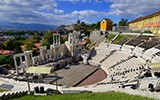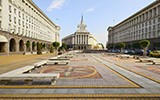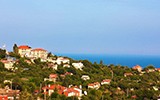Do you wish to open a bank account in Bulgaria? Find out how to proceed in this article.
Living in Bulgaria guide for expats
All the information you need to relocate and live in Bulgaria.
Our selection of articles for expatriation in Bulgaria
Wondering about health care in Bulgaria? How to access to these and what are the fees applied? Find out in this article.
Bulgaria is another name in the list of underestimated travel destinations, but things are changing. Having been nicknamed ...
Being Bulgaria's second biggest city, Plovdiv also provides many career prospects. Find out more about these in this ...
Looking for a job in Varna? Find out what are the most promising sectors for foreigners in this article.
There are various ways to find a job in Sofia. Here are some tips to guide you through your job search.
Find, in this article, an overview of the Bulgarian labor market and tips to help you find a job if you intend to work there.
Do you have to pay taxes in Bulgaria? How to proceed and what are the conditions attached? Find out in this article.
Foreigners staying in Sofia can choose from various means of transport. Here is an overview of the transport network.
To travel around in Bulgaria, you can choose among different means of transport. Find out about these in this article.
Do you dream of pursuing your higher studies in Bulgaria? Find out what you need to know on this country's higher education ...
Would you like your pet to accompany you during your trip to Bulgaria? Find out how to proceed in this article.
If you intend to travel to Bulgaria, whether for a long or short-term stay, here is a summary of formalities you have to fill ...
Are you moving to Bulgaria? Find out in this article whether you have to apply for a visa and how to proceed.
Are you looking forward to set up a business in Bulgaria? Here is an overview of conditions to be met and related procedures.
About Bulgaria
Over the years, Bulgaria has been attracting expatriates in large numbers. Its education and culture wealth are two main reasons which have motivated their choices. In fact, located in South-East Europe, it has been highly influenced by the region's cultural heritage. Moreover, Bulgaria is a high demand destination when it comes to career prospects, thanks to its developed economy. The country provides more employment opportunities than anywhere else in Europe.
Moreover, travel formalities for European nationals are quite simple. So if you intend to move there, you are definitely likely to enjoy its environment and openings.
Geography and demography
Stretching over some 110, 8 km², the Republic of Bulgaria occupies the eastern part of the Balkan Peninsula. It is bordered by Romania, Turkey, Greece, Macedonia and Serbia. The country is a member of the European Union since 2007. To date, its population consists of more than 7 million inhabitants, with a majority of Bulgarians, along with other important ethnic groups, namely 9% of Turks and 5% of Gypsies respectively.
Sofia is Bulgaria's capital city with more than 1.2 million inhabitants. Plovdiv and Varna are two of its major cities, mainly in terms of their demography and economic activities. Sofia is also known to be Bulgaria's academic center as it hosts the country's most prestigious university, St. Clement of Ohrid.
Plovdiv, for its part, is the second university center and the second biggest city after Sofia. It is also known as the European Cultural capital city. Finally, Varna is the largest Bulgarian city on the Black Sea coast. It is very popular with tourists, as well as with students.
Languages
Bulgarian nationals speak Bulgarian, which is a South Slavic language. It is the country's official language and spoken as well in neighboring countries such as Ukraine, Moldova, Macedonia, Romania, Greece, Turkey and in a part of Serbia.
The Bulgarian language is written in Cyrillic. However, graphics and pronunciation differ somewhat from Russian.
Economy
Despite being part of the European Union, the country's official currency is still the Bulgarian lev. Nowadays, Bulgaria is a developed country with an economy which is primarily based on the private sector. Energy, mining, light industry and tourism are its main sources of income and economic activity.
Indeed, Bulgaria has a powerful energy network, one of the most important European networks. Moreover, the industrial field consists of the production of copper, zinc, steel, coal, large-scale tobacco, etc. As regards the heaving industry, it involved fuel refinement, car production and repair, automotive and communication equipment, electronics and military equipment, etc.
Note that there are many employment opportunities in the public sector as in the private sector.
Climate
Bulgaria is a mountainous country. In the South, the Rhodopes mountain range forms a geographical and climatic barrier with Greece. However, in spring and summer, temperatures are regulated between the fresh mountain air and the warm Aegean Sea breeze.
The rest of the country experiences a continental climate with hot and dry summers and cold and snowy winters with many mountain snowfalls, up to May. As regards the tourism season, especially on the Black Sea coast, it starts as from June to end by September with an average temperature of 27°C on land and 23°C at sea.
Useful links:
Official Tourism Website of Bulgaria bulgariatravel.org
European Union Official Portal europa.eu
Latest housing offers in Bulgaria
Latest job offers in Bulgaria












